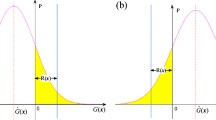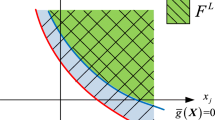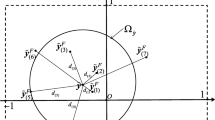Abstract
Hybrid reliability analysis (HRA) with both aleatory and epistemic uncertainties is investigated in this paper. The aleatory uncertainties are described by random variables, and the epistemic uncertainties are described by a probability-box (p-box) model. Although tremendous efforts have been devoted to propagating random or p-box uncertainties, much less attention has been paid to analyzing the hybrid reliability with both of them. For HRA, optimization-based Interval Monte Carlo Simulation (OIMCS) is available to estimate the bounds of failure probability, but it requires enormous computational performance. A new method combining the Kriging model with OIMCS is proposed in this paper. When constructing the Kriging model, we only locally approximate the performance function in the region where the sign is prone to be wrongly predicted. It is based on the idea that a surrogate model only exactly predicting the sign of performance function could satisfy the demand of accuracy for HRA. Then OIMCS can be effectively performed based on the Kriging model. Three numerical examples and an engineering application are investigated to demonstrate the performance of the proposed method.
Similar content being viewed by others
References
Helton J.C.: Uncertainty and sensitivity analysis in the presence of stochastic and subjective uncertainty. J. Stat. Comput. Simul. 57, 3–76 (1997)
Bae H.R., Grandhi R.V., Canfield R.A.: Epistemic uncertainty quantification techniques including evidence theory for large-scale structures. Comput. Struct. 82, 1101–1112 (2004)
Der Kiureghian A.: Analysis of structural reliability under parameter uncertainties. Probab. Eng. Mech. 23, 351–358 (2008)
Choi J., An D., Won J.: Bayesian approach for structural reliability analysis and optimization using the Kriging Dimension Reduction Method. J. Mech. Des. 132, 051003 (2010)
Davis J.P., Hall J.W.: A software-supported process for assembling evidence and handling uncertainty in decision-making. Decis. Support Syst. 35, 415–433 (2003)
Augustin T.: Optimal decisions under complex uncertainty-basic notions and a general algorithm for data-based decision making with partial prior knowledge described by interval probability. ZAMM-J. Appl. Math. Mech. 84, 678–687 (2004)
Troffaes M.C.M., Miranda E., Destercke S.: On the connection between probability boxes and possibility measures. Inf. Sci. 224, 88–108 (2013)
Crespo L.G., Kenny S., Giesy D.: Reliability analysis of polynomial systems subject to p-box uncertainties. Mech. Syst. Signal Process. 37, 121–136 (2013)
Jiang C., Zhang Z., Han X., Liu J.: A novel evidence-theory-based reliability analysis method for structures with epistemic uncertainty. Comput. Struct. 129, 1–12 (2013)
Beer, M., Ferson, S.: Fuzzy probability in engineering analyses. In: Proceedings of the First International Conference on Vulnerability and Risk Analysis and Management (ICVRAM 2011) and the Fifth International Symposium on Uncertainty Modeling and Analysis (ISUMA 2011) (2011)
Hurtado J.E., Alvarez D.A., Ramírez J.: Fuzzy structural analysis based on fundamental reliability concepts. Comput. Struct. 112, 183–192 (2012)
Jiang C., Bi R.G., Lu G.Y., Han X.: Structural reliability analysis using non-probabilistic convex model. Comput. Methods Appl. Mech. Eng. 254, 83–98 (2013)
Luo Y.J., Alex L., Kang Z.: Reliability-based design optimization of adhesive bonded steel–concrete composite beams with probabilistic and non-probabilistic uncertainties. Eng. Struct. 33, 2110–2119 (2011)
Elishakoff I.: Essay on uncertainties in elastic and viscoelastic structures: from AM Freudenthal’s criticisms to modern convex modeling. Comput. Struct. 56, 871–895 (1995)
Beer M., Ferson S., Kreinovich V.: Imprecise probabilities in engineering analyses. Mech. Syst. Signal Process. 37, 4–29 (2013)
Ferson S., Kreinovich V., Ginzburg L., Myers D.S., Sentz K.: Constructing probability boxes and Dempster–Shafer structures, vol. 835. Sandia National Laboratories, Albuquerque (2002)
Alvarez D.A.: On the calculation of the bounds of probability of events using infinite random sets. Int. J. Approx. Reason. 43, 241–267 (2006)
Alvarez D.A.: A Monte Carlo-based method for the estimation of lower and upper probabilities of events using infinite random sets of indexable type. Fuzzy Sets Syst. 160, 384–401 (2009)
Batarseh, O.G., Wang, Y.: Reliable simulation with input uncertainties using an interval-based approach. In: Simulation Conference, 2008. WSC 2008. Winter 2008, pp. 344–352
Zhang H., Mullen R.L., Muhanna R.L.: Interval Monte Carlo methods for structural reliability. Struct. Saf. 32, 183–190 (2010)
Zhang H.: Interval importance sampling method for finite element-based structural reliability assessment under parameter uncertainties. Struct. Saf. 38, 1–10 (2012)
Zhang H., Dai H., Beer M., Wang W.: Structural reliability analysis on the basis of small samples: an interval quasi-Monte Carlo method. Mech. Syst. Signal Process. 37, 137–151 (2013)
Jiang C., Li W.X., Han X., Liu L.X., Le P.H.: Structural reliability analysis based on random distributions with interval parameters. Comput. Struct. 89, 2292–2302 (2011)
Hurtado J.E.: Assessment of reliability intervals under input distributions with uncertain parameters. Probab. Eng. Mech. 32, 80–92 (2013)
Xiao N.C., Huang H.Z., Wang Z., Pang Y., He L.: Reliability sensitivity analysis for structural systems in interval probability form. Struct. Multidisc. Optim. 44, 691–705 (2011)
Qiu Z., Yang D., Elishakoff I.: Probabilistic interval reliability of structural systems. Int. J. Solids Struct. 45, 2850–2860 (2008)
Eldred M.S., Swiler L.P., Tang G.: Mixed aleatory-epistemic uncertainty quantification with stochastic expansions and optimization-based interval estimation. Reliab. Eng. Syst. Saf. 96, 1092–1113 (2011)
Du X.: Reliability-based design optimization with dependent interval variables. Int. J. Numer. Methods Eng. 91, 218–228 (2012)
Luo Y.J., Kang Z., Alex L.: Structural reliability assessment based on probability and convex set mixed model. Comput. Struct. 87, 1408–1415 (2009)
Du X.: Unified uncertainty analysis by the first order reliability method. J. Mech. Des. 130, 091401–091410 (2008)
Yao W., Chen X., Huang Y., Tooren M.: An enhanced unified uncertainty analysis approach based on first order reliability method with single-level optimization. Reliab. Eng. Syst. Saf. 116, 28–37 (2013)
Balu A.S., Rao B.N.: Multicut-high dimensional model representation for structural reliability bounds estimation under mixed uncertainties. Comput. Aid. Civ. Infrastruct. Eng. 27, 419–438 (2012)
Guo J., Du X.: Sensitivity analysis with mixture of epistemic and aleatory uncertainties. AIAA J. 45, 2337–2349 (2007)
Moens D., Hanss M.: Non-probabilistic finite element analysis for parametric uncertainty treatment in applied mechanics: Recent advances. Finite Elem. Anal. Des. 47, 4–16 (2011)
Ang A., Tang W.: Probability Concepts in Engineering Planning and Design, vol. 1. Wiley, New York (1975)
Dai H., Wang W.: Application of low-discrepancy sampling method in structural reliability analysis. Struct. Saf. 31, 55–64 (2009)
Vanhatalo, J.: GPstuff: Gaussian process models for Bayesian analysis V2.0. (2010). http://pmtksupport.googlecode.com/svn/trunk/GPstuff-2.0/dist/hammersley.m
Gablonsky, J.: Implementation of the DIRECT Algorithm. Center for Research in Scientific Computation, Technical Rept. CRSC-TR98-29, North Carolina State Univ., Raleigh, NC (1998)
Bichon B.J., Eldred M.S., Swiler L.P., Mahadevan S., McFarland J.M.: Efficient global reliability analysis for nonlinear implicit performance functions. AIAA J. 46, 2459–2468 (2008)
Echard B., Gayton N., Lemaire M.: AK-MCS: an active learning reliability method combining Kriging and Monte Carlo simulation. Struct. Saf. 33, 145–154 (2011)
Bect J., Ginsbourger D., Li L., Picheny V., Vazquez E.: Sequential design of computer experiments for the estimation of a probability of failure. Stat. Comput. 22, 773–793 (2012)
Balesdent M., Morio J., Marzat J.: Kriging-based adaptive importance sampling algorithms for rare event estimation. Struct. Saf. 44, 1–10 (2013)
Picheny V., Ginsbourger D., Roustant O., Haftka R.T., Kim N.H.: Adaptive designs of experiments for accurate approximation of a target region. J. Mech. Des. 132, 071008 (2010)
Dubourg V., Sudret B., Bourinet J.M.: Reliability-based design optimization using Kriging surrogates and subset simulation. Struct. Multidiscip. Optim. 44, 673–690 (2011)
Ranjan P., Bingham D., Michailidis G.: Sequential experiment design for contour estimation from complex computer codes. Technometrics 50, 527–541 (2008)
Jones D., Schonlau M., Welch W.: Efficient global optimization of expensive black-box functions. J. Glob. Optim. 13, 455–492 (1998)
Yang, X., Liu, Y., Gao, Y., Zhang, Y., Gao, Z.: An active learning Kriging model for hybrid reliability analysis with both random and interval variables. Struct. Multidisc. Optim. (accepted). doi:10.1007/s00158-014-1189-5
Matheron G.: The intrinsic random functions and their applications. Adv. Appl. Probab. 5, 439–468 (1973)
Dumas A., Echard B., Gayton N., Rochat O., Dantan J.Y., Veen S.V.D.: AK-ILS: an active learning method based on kriging for the inspection of large surfaces. Precis. Eng. 37, 1–9 (2013)
Lophaven, S.N., Nielsen, H.B., Sondergaard, J.: DACE, a MATLAB Kriging toolbox, version 2.0. Tech. Rep. IMM-TR-2002-12; Technical University of Denmark (2002)
Luo X., Li X., Zhou J., Cheng T.: A Kriging-based hybrid optimization algorithm for slope reliability analysis. Struct. Saf. 34, 401–406 (2012)
Kaymaz I.: Application of kriging method to structural reliability problems. Struct. Saf. 27, 133–151 (2005)
Jiang C., Wang B., Li Z.R., Han X., Yu D.J.: An evidence-theory model considering dependence among parameters and its application in structural reliability analysis. Eng. Struct. 57, 12–22 (2013)
Author information
Authors and Affiliations
Corresponding author
Rights and permissions
About this article
Cite this article
Yang, X., Liu, Y., Zhang, Y. et al. Hybrid reliability analysis with both random and probability-box variables. Acta Mech 226, 1341–1357 (2015). https://doi.org/10.1007/s00707-014-1252-8
Received:
Revised:
Published:
Issue Date:
DOI: https://doi.org/10.1007/s00707-014-1252-8




